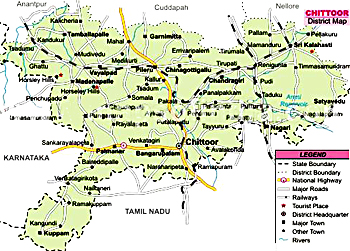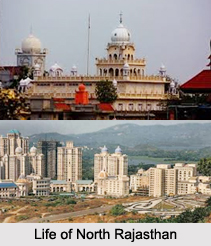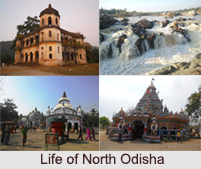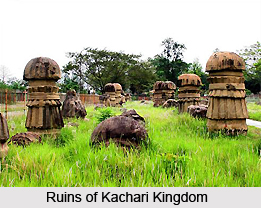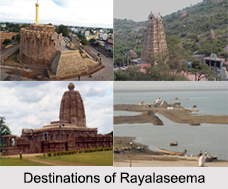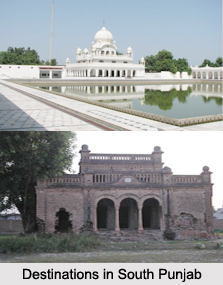About Ajmer District
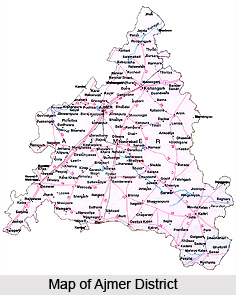 The district of Ajmer in Rajasthan is venerated for its holy shrines. It is a small but pictorial town that offers an interesting stay for the visitors. Over the years it has evolved as an important tourist destination. Its temples and the dargah are enough reasons for the tourists to visit this site that is accessible from almost all the leading cities of Rajasthan.
The district of Ajmer in Rajasthan is venerated for its holy shrines. It is a small but pictorial town that offers an interesting stay for the visitors. Over the years it has evolved as an important tourist destination. Its temples and the dargah are enough reasons for the tourists to visit this site that is accessible from almost all the leading cities of Rajasthan.
Location of Ajmer: The district of Ajmer covers an area of 8,481 km². It is located at the heart of the state of Rajasthan. In the north of the Ajmer district, it is bound by Nagaur District, Jaipur and Tonk to the east, Pali District to the west and Bhilwara District to the south.
Travel Information on Ajmer: The best season to visit Ajmer is from July to March. The nearest airport to Ajmer district is at Jaipur. From here means of transport are available to arrive at the district of Ajmer. Regular train services connect Delhi, Mumbai, Bangalore and other cities with Ajmer. Bus facilities are also available to reach the city. Accommodations are scattered throughout the district to accommodate the tourists.
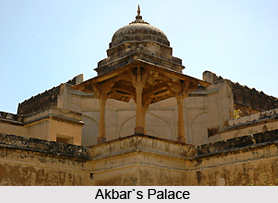 Accommodation in Ajmer: There are several kinds of hotels in Ajmer. Those who are looking forward for luxurious vacations there are heritage hotels and for others there are economic and budget hotels. The services at the hotels of Ajmer reflect the Rajputana hospitality.
Accommodation in Ajmer: There are several kinds of hotels in Ajmer. Those who are looking forward for luxurious vacations there are heritage hotels and for others there are economic and budget hotels. The services at the hotels of Ajmer reflect the Rajputana hospitality.
Ajmer City: This is historically important. It is the central place around which the district has slowly developed. Most of the important landmarks, such as, the fort, the dargah and the museum are located within the city.
Places of Interest in Ajmer: The local attractions at Ajmer comprise of Adhai Din ka Jhonpra, Taragarh Fort, Akbar`s Palace, Ana Sagar and Foy Sagar, Dargah Sharif, Nasiyan Jain Temple and many others.
Places of Interest around Ajmer: there are tourist sites that are located around the city but they fall within the district. These tourist attractions are Kishangarh, Roopangarh and Makrana.
History of Ajmer
The history of Ajmer district is full of the splendid tales of Kings and palaces. The earliest inhabitants of the place, in fact all of Rajasthan, were the people of the great civilisation of Harappa. In about 2000 B.C. the horse-riding Aryans came here from Central Asia. One of the very first dynasties to rule over large parts of India, the Mauryan dynasty, ruled over this area in around 400 AD. Ajmer was founded in the 7th century AD by Raja Ajay Pal Chauhan. When Ajay Pal Chauhan founded Ajmer, he constructed the hill fort of `Ajaimeur`, meaning the Invincible Hill. Following the Chauhan dynasty, Ajmer was ruled by many dynasties. It continued to function as one of the major centres of Chauhan power till 1193 AD. In this year, Prithviraj Chauhan lost it to Muhammad Ghori. Thereafter, it became a part of the Delhi Sultanate. Ajmer was also a favourite residence of the rulers of the Mughal dynasty.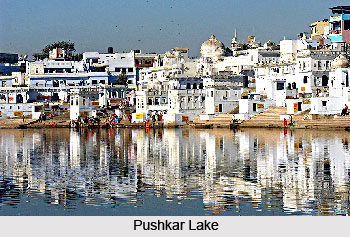 It was here in Ajmer that one of the first contacts between the Mughal King Jahangir and Sir Thomas Roe took place in the year 1616. One of the most significant periods in the history of Rajasthan is the modern period, which lasted between 1707 and 1947. Though the Mughal Emperor Akbar was able to create a separate province of Rajasthan, political disintegration began with the fall of the Mughal dynasty. When the Marathas got an opportunity to invade Ajmer in 1755, they finally captured Ajmer. The Scindias took over the city in 1818 and then handed it over to the British and it became one of the only parts of Rajasthan controlled directly by the British East Indian Company.
It was here in Ajmer that one of the first contacts between the Mughal King Jahangir and Sir Thomas Roe took place in the year 1616. One of the most significant periods in the history of Rajasthan is the modern period, which lasted between 1707 and 1947. Though the Mughal Emperor Akbar was able to create a separate province of Rajasthan, political disintegration began with the fall of the Mughal dynasty. When the Marathas got an opportunity to invade Ajmer in 1755, they finally captured Ajmer. The Scindias took over the city in 1818 and then handed it over to the British and it became one of the only parts of Rajasthan controlled directly by the British East Indian Company.
The history of Ajmer still resounds in the various monuments that are strewn around here, echoing the district`s past glory. Ajmer is a popular pilgrimage centre for the Hindus as well as Muslims. Especially famous is the Ajmer e Sharif -Tomb of the Sufi Saint Khwaja Moinuddin Chisti, which is equally revered by the Hindus and Muslims. Ajmer is a great centre of culture and education. The British chose Ajmer for its prestigious Mayo College, a school exclusively for Indian nobility. Ajmer is also the base for visiting Pushkar (11 km.), the abode of Lord Brahma, lying to its west with a temple and a picturesque lake. The Pushkar Lake is a sacred spot for Hindus. During the month of Kartik (October-November), devotes throng in large numbers here to take a dip in the sacred lake.
Leisure Tourism in Ajmer district
Leisure tourism in Ajmer district is a journey into the past. Ajmer is a historic place, with a long and rich cultural tradition. Consequently, one of the most popular sites of tourism in all of Rajasthan is Ajmer district, and in particular tourism in Ajmer city. Forts, museums and more are much visited spots of tourism located in the district of Ajmer. Discussed below are the various places of historical importance in Ajmer District.
The Taragarh fort is a giant structure that stands guarding the city of Ajmer. The fort, providing a panoramic view of the city, can be entered by six gates. The fort also has Miran Saheb ki Dargah who was the governor of the fort and laid down his life in an encounter. Situated in Nagpahari of the Aravalli mountain ranges, this fort has immense archaeological and historical importance.
The Adhai-din-ka-jhonpra is an outstanding example of Indo-Islamic architecture. Legend has it that the fort was constructed in two and a half days, thus acquiring the name. It is a relic of an old mosque consisting of a quadrangle with a front screen wall of seven pointed arches. The distinct pillars and arched screen with its ruined minarets make it a splendid architectural masterpiece.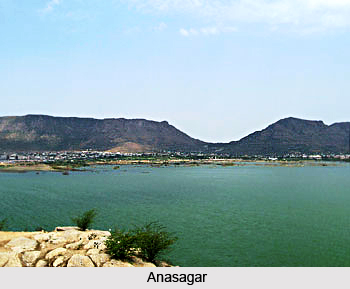 The Ana Sagar is an artificial lake named after Anaji Chauhan. The construction of the Lake was helped in a major way by the local populace. The catchments were built with their help. The Baradari pavilions here were built by Shah Jahan to facilitate his long stays in Ajmer. The Baradari and the parks adjoined to it are a much-visited picnic spot of the city.
The Ana Sagar is an artificial lake named after Anaji Chauhan. The construction of the Lake was helped in a major way by the local populace. The catchments were built with their help. The Baradari pavilions here were built by Shah Jahan to facilitate his long stays in Ajmer. The Baradari and the parks adjoined to it are a much-visited picnic spot of the city.
Akbar`s fort was built in the year 1570 AD by the Mughal Emperor Akbar. The fort was used as the residence of the Emperor during his visits to Ajmer. It is a massive square building with lofty octagonal bastions at each corner. In the middle of the fort there is a beautiful audience chamber and a magnificent gateway towards the west facing the town. It was in this very fort that Sir Thomas Roe, the accredited ambassador of King James I of England, presented himself in Jahangir`s court on 10th January 1615 AD, and delivered his first official credentials. The fort is protected by the State Govt. under the provisions of the Rajasthan Monuments, Archaeological sites and Antiquity act.1561.
The Government Museum is situated inside Akbar`s fort in Ajmer. It was established in Oct. 1908 under the initiative of Lord Curzon and Sir John Marshall, the then Director General of Archaeology in India. The aim of the museum is to focus on the cultural heritage of the region through its exhibits. The museum primarily consists of sculptures, inscriptions, a pre-historic section, miniature paintings, arms and armour and objects of art and crafts.
Thus mentioned are the various places of leisure tourism located in the district of Ajmer.











